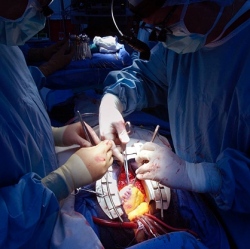
Scientists turned heart cells into pacemaker cells by injecting a gene. The "biological pacemaker" was able to "effectively cure a disease", said scientists from the Cedars-Sinai Heart Institute in Los Angeles. The British Heart Foundation said applications of the research, published in Science Translational Medicine, were "a long way off".
The researchers injected a gene into pigs with a heart condition that causes a very slow heart rate. The gene therapy converted some of the billions of ordinary heart muscle cells into much rarer specialised cells that kept the heart beating in rhythm. The patch of cells the size of a peppercorn had acted as a pacemaker for two weeks, taking over the function of a conventional pacemaker, said the US team.
"We have been able, for the first time, to create a biological pacemaker using minimally invasive methods and to show that the biological pacemaker supports the demands of daily life," said Dr Eduardo Marban, who led the research team. "We also are the first to reprogram a heart cell in a living animal in order to effectively cure a disease." Conventional pacemakers are electronic devices that are implanted into the chest to control an abnormal heartbeat.
